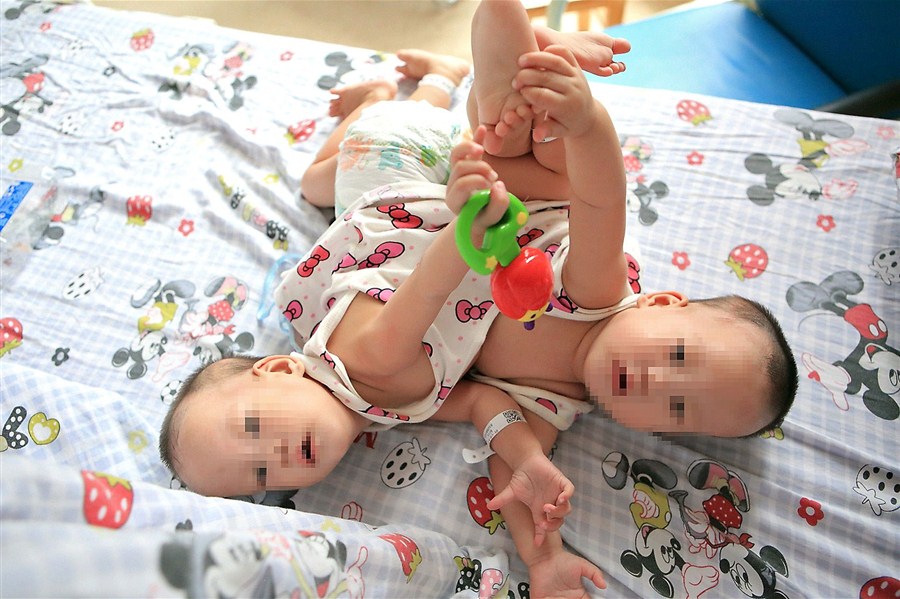Conjoined twins to be separated
Shanghai Daily, July 15, 2014 Adjust font size:

|
Conjoined twins Zheng Hanjing and Zheng Hanwei at the medical center. [Photo / Shanghai Daily] |
Shanghai doctors will tomorrow attempt to separate 10-month-old conjoined twin girls.
Doctors from the Shanghai Children's Medical Center said that ideally the operation should have taken place some months ago, when the girls' bones were softer.
They added that the operation, which is expected to take about four hours, brings a risk of infection in the large wounds that will be created.
Sharing one liver and part of the heart-sac — the double-wall membrane that holds the heart and the roots of the great vessels — the girls are connected from the lower chest to the upper belly, a length of just under 18 centimeters.
The sisters have separate hearts and their own blood systems for the liver, said the medics.
"The girls have missed the best time for separation surgery, which should have been done when they were three or four months old," Dr Chen Qimin, director of the hospital's surgery department and the girls' chief surgeon, said yesterday.
"We have organized a team with top experts on general surgery, heart and orthopedics for the girls" procedures.
Abandoned at birth, the twins were taken in by a children's home in Pingdingshan in central China's Henan Province and named Zheng Hanjing and Zheng Hanwei.
Home staff contacted the Beijing-based Angel Home charity organization for help and moved the girls to the charity's Beijing center last August for better medical care.
After consulting many hospitals in Beijing, Tianjin and Shanghai, the charity and children's home decided to send the girls to the Shanghai Children's Medical Center, where three pairs of conjoined twins have already been separated.
The girls, who weigh a combined 13.7 kilograms, arrived in Shanghai on June 19.
"Based on our experiences from previous conjoined twins, we want not only to separate the girls from each other, but also for them to be able to jump and run like healthy children," Chen said.
Two frames measured to the size of the girls' bodies have been specially made and will support them after surgery to ensure proper healing and growth.
They also take into account the close bond between the little girls.
"The design of the frames allow them to lie face-to-face, exactly as they would before surgery," said Dr Xu Zhuoming, director of the hospital's intensive care unit.
"Conjoined twins have an even more special connection than other twins, as they see each other every time they open their eyes and can touch each other all the time," she added.
"Allowing them see each other after surgery is good for their psychological state and overall stability," said Xu.
In addition to the surgery, after-surgery care is also a challenge. The hospital has allocated a special intensive care unit room for the girls, as their care is very complicated, she said.
The little girls both have congenital curvature of the spine.
While this won't be treated in this surgery, doctors said they will follow the girls' progress and offer proper guidance concerning their situation.
A representative from the Pingdingshan children's home in Henan said staff were touched by the care and kindness the twins were receiving in Shanghai.
He said the money for the sisters' surgery was collected through donations from individuals and companies.

